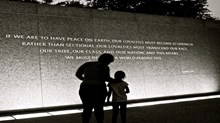Called to Peace

Colossians 1:18-20 The Message
He was supreme in the beginning and—leading the resurrection parade—he is supreme in the end. From beginning to end he’s there, towering far above everything, everyone. So spacious is he, so roomy, that everything of God finds its proper place in him without crowding. Not only that, but all the broken and dislocated pieces of the universe—people and things, animals and atoms—get properly fixed and fit together in vibrant harmonies, all because of his death, his blood that poured down from the cross.
Last week I wrote that the biblical idea of peace, (shalom in the Hebrew OT and eirene in the Greek NT) is not about a reality free of conflict or pain, but instead a reality that exists as complex parts come to fit together. You can read the article here.
You can also find a good word study video done by the Bible Project here. Biblical peace is about wholeness, completeness and a space where nothing is lacking. Peace is one of the Messianic expectations. Israel was looking for The Prince of Peace. And this is what we find in Jesus, even though many in Israel (as well as many believers today) were surprised by His peaceful way.
Jesus is our peace. The Colossians “Christ Hymn” above (Colossians 1:15-20) claims that every complexity of God comes together in Jesus. Think about this. The complexity and mystery and brilliance of the Godhead, the three in one reality of God manifest in the reality of Jesus. Jesus is the complete representation of God. This means that if we have any question about God, who God is, what God is like, or what God is up to, we can look at Jesus. So within Himself, Jesus is peace. But there is more.
Jesus opens Himself to invite others to this peace. This gives me such hope in the midst of such tragedy today. Jesus, who sits as the Head of the Church, situates all of the broken people, and all of the complexities of this present darkness together. Within the church, local faith communities, we can find peace. Why does this matter today?
We are living during a time in history where all of the complex pieces of systemic racism are floating around like flying pieces of a home that exploded from the inside. News outlets, social media influencers, church leaders and just about every secular business is talking about racism, many attempting to publish anti-racist statements in solidarity with the black community. What does this have to do with Jesus followers?
There are some who would say that the “Black Lives Matter” efforts and racial justice conversations are a ploy of liberal politics and progressive Christians to minimize the nuclear family, defund the police to bring anarchy and elevate diversity at the cost of morality. They would say that to focus on the ‘systemic’ sin of racism is missing the point and we should instead spend our good Christian efforts on individual salvation from sin. The logic goes that if we would all “be saved” from sin then we wouldn’t be having all of these race problems. The system is not sinful, it’s the individuals within the system and to focus on the system as the problem is to miss the heart of the problem, which is (in their minds) individual sin. Here is the problem.
1. There have been a countless number of white born again “saved from sin” Christians who justified slave ownership using their faith and using the bible. What of their salvation from sin?
2. Jesus didn’t come to only save people from sin. There I said it. Certainly part of the mission of Jesus was to save people from sin, but Jesus came to establish God’s reign on the earth, which involves salvation from sin. There has been so much written about this thesis, you could fill a library with books on the topic. I suggest beginning with The King Jesus Gospel by Scot McKnight. It is the most equally accessible and scholarly work I have read on the theology of the Kingdom of God.
The Kingdom of God is the place where God reigns, the place of equality for all humans, the place of justice, the place of unity, peace and love. It is tangible, it is material and it is, yes, even systemic. Jesus disrupted the systemic racism in his world. He touched the lepers who were considered unclean. He engaged the Samaritan women publicly. He forgave the prostitute, the adulterer and the tax collector. He ate with Gentile sinners, women and the dirt poor outcasts. Jesus challenged the temple system as being sinful, burdensome and unfair.
He even caused a big ole’ ruckus by turning over some tables in the temple. Can you imagine somebody getting that angry in church? He defied the leaders of the Jewish religion publicly, the Pharisees, who put the burden of the law on people without love or compassion. He even went on to act in rebellious (what would have been considered “sinful”) ways by healing on the Sabbath and touching unclean people and not atoning for it. He went on to establish a church led by the likes of Peter and Paul who coached their small house churches to not consider anything unclean, and to welcome each other as brothers and sisters, to tolerate eachother’s dietary restrictions and not to hinder anyone from faith based on maturity.
Jesus brought peace within each believer through the forgiveness and eventual salvation from sin, yes. But he brought peace on the outside too. As the Church, the Body of Christ, it is our role to extend peace that Jesus offers, salvation from sin to the world and it is also our role to bring peace at the systemic level.
Jesus Creed is a part of CT's
Blog Forum. Support the work of CT.
Subscribe and get one year free.
The views of the blogger do not necessarily reflect those of Christianity Today.



















